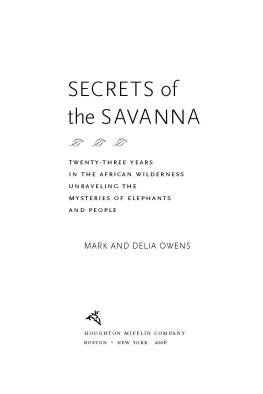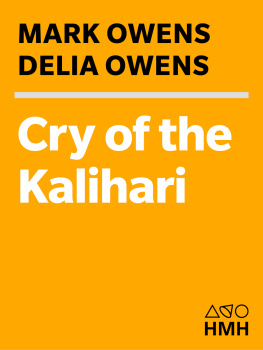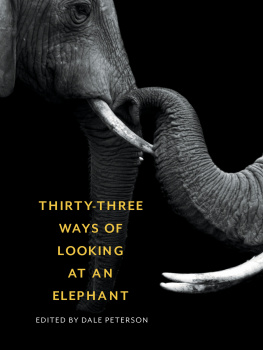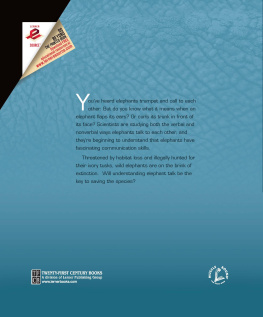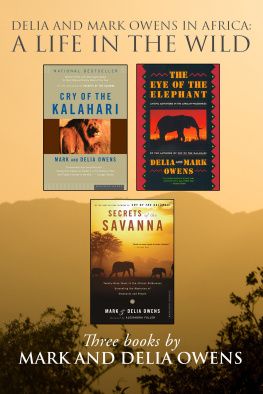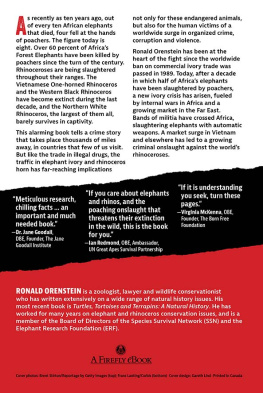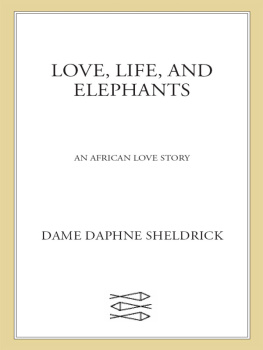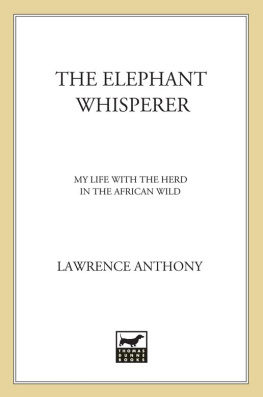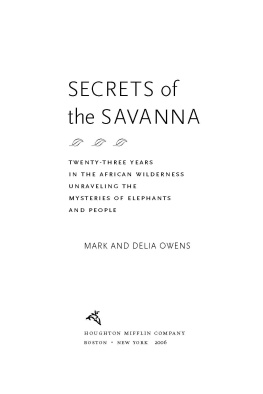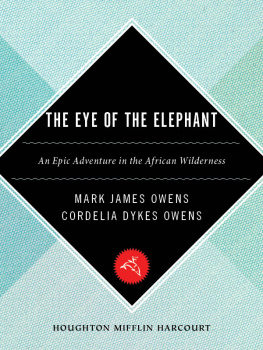TO BOB AND JILL
From guinea fowl pie in the Kalahari
to camping in the Luangwa bog,
thank you for everything.
Love always.
Copyright 2006 by Mark Owens and Delia Owens
All rights reserved
For information about permission to reproduce selections
from this book, write to Permissions, Houghton Mifflin Company,
215 Park Avenue South, New York, New York 10003.
Visit our Web site: www.houghtonmifflinbooks.com.
Library of Congress Cataloging-in-Publication Data
Owens, Mark.
Secrets of the savanna : twenty-three years in the African wilderness
unraveling the mysteries of elephants and people / Mark and Delia Owens.
p. cm.
Includes index.
ISBN -13: 978-0-395-89310-4
ISBN -10: 0-395-89310-0
1. African elephantConservationLuangwa River Valley (Zambia
and Mozambique) 2. African elephantEffect of hunting onLuangwa
River Valley (Zambia and Mozambique) 3. Nature conservation
Economic aspectsLuangwa River Valley (Zambia and Mozambique)
4. Owens, Delia. 5. Owens, Mark. I. Owens, Delia. II. Title.
QL 737. P 98095 2006
599.67'4dc22 2005023842
Printed in the United States of America
QUM 10 9 8 7 6 5 4 3 2 1
Foreword
N OT SO FAR , relatively speaking, from where I spent the last years of my childhood in Zambia, there is a valley so rare and surprising in its beauty that once seen and heard and smelled, the sense of it stays with you always. Forever after, a tiny breath of it might come back to you in other placessay in a hint of dust in Italy or in the way the sun catches the land in Mexicoand you feel the tug of memory of that place. This valley is so rich with life that it seems entirely possible that Life itself started here, or at least that it congregated here in uncommon splendor and diversity. The landscape seems ideally suited to such majestic sights as herds of elephants casually fording a river or the philosophic stare of baboons at sunset. Perhaps that is why memory settles on the valley as a place of origin, as if we knew it in some other, wiser time.
But this valleythis template for what we might all have grown up with, or lived near, if we had not so carelessly eaten our way through our own wild lands long agowas almost completely lost. When I was young, in the 1980s, North Luangwa National Park (for this is the valley of which I am speaking) was so rotten with heavily armed poachers and so corrupted with the blood money of elephants that anyone who ventured near it was considered foolhardy, if not downright stupid. Not only was the valley itself infested with armed gangs, but the villagers who lived in the land surrounding the park had been pressed into the service of the poacherswho were very often in the pay of powerful government officials and business people in the cities. Many thought that the valley was as good as gone.
But that was before Mark and Delia Owens happened upon the park and fell in loveillogically, incautiouslywith a land so very nearly reaped of all its life that it had all but been left to die. This book is an account of the Owenses' years in that valley and with the people who live on its periphery. It is the story of how, together with the villagers and their chiefs, Mark and Delia gradually peeled away the dark years of elephant poaching and allowed both the valley and the settlements to flourish. In other words, the Owenses and the local people achieved what has been replicated in very few places in the world: a balance in which humans and wildlife have found strategies to coexist, not in some unsustainable primitive dream but in a viable, respectful way, with new ideas and resources building on the best of the old traditions. And in the process of saving the park, the Owenses found pieces of themselves in the sly, sometimes wickedly funny wisdom of the men and women with whom they worked. This book tells that story too.
However, as romantic as it sounds to hitch oneself to a dream and to attach oneself to an impossibly noble goal, the reality of years of gritty, flies-in-your-eyes, malarial loneliness in the name of love of land, humanitarianism, and science is not for anyone with less than a lion heart. I can't emphasize enough what courage and dedicationto say nothing of sheer stubborn passionit must have taken for Mark and Delia Owens to rescue North Luangwa National Park while poachers and corrupt politicians and officials did everything they could to hurt them and derail their work and while even the land and the animals sometimes seemed ungrateful for their efforts. But with almost superhuman perseverance, the Owenses refused to give up until their goal of a valley without poachers had been achieved.
I recently returned to Zambia for a magazine assignment and spent time with Hammer Simwinga (the Owenses' protg, a sort of agriculture extension officer for the region, and every bit the hero described in these pages), and I met some of the traditional birth attendants, beekeepers, farmers, fish farmers, and shopkeepers described here. The work that the Owenses instigated has outlived their time in the valley, and there can be no greater tribute than that. In the words of one villager, "You cannot separate the Owenses from this place. What they have done has changed our lives for the better." It is true, the Owenses cannot be separated from this place, which is ingrained in them forever.
A LEXANDRA F ULLER
Prologue
Mark
One touch of Nature makes the whole world kin.
W ILLIAM S HAKESPEARE
A HEAVY FOG, thick and white, settled lower over the hills of Masailand in Kenya. I eased off the power and slowed down but pulled back on the cyclic stick, giving up altitude grudgingly. Our chopper's main rotor tore ragged chunks out of the cloud's underbelly and stirred great corkscrews of vapor that trailed behind us as we flew on. Fifty feet below us, malachite green hilltops dotted with flat-topped acacias and running giraffessnapshots of Africaflashed into view out of the white, then were lost to opacity. We flew on, while the fog squatted heavy on the hilltops, forcing us to skirt around and between them. But then the vapor began filling the valleys ahead; we were fast losing sight of the ground.
I keyed the intercom: "We've got to land while we still can; help me look for a place." Delia pressed her forehead to the cockpit window, scanning the terrain. Forested valleys and too steep hillsides all around: no place here.
To our right and slightly above us, a single rounded peak was still visible. But the clouds were already settling over it, like a goose on a nest. I banked hard right, pulled on some power, and climbed the slope. We popped onto the hilltop and planted our skids; even before the rotor wound to a stop, we could barely see beyond the blades.
Our camp in the remote northern Luangwa Valley of Zambia was still almost nine hundred miles and more than ten flying hours away. We would never make it before dark.
We unbuckled our safety harnesses, opened the doors, and stepped into the fragrant, misty air and into a surreal, palpable quiet. I have experienced such an utter absence of sound only among the old-growth Sitka spruce and hemlock forests of southeastern Alaska, where the wisps of moss clinging to tree trunks and branches and matting the forest floor absorb sound so completely that you can hear your pulse swishing in your ears with each heartbeat. Now, as Delia and I stood by the helicopter, we could see nothing beyond the ground immediately around us, could hear nothing but the occasional flinty ping of the chopper's cooling turbine.
Then, through particles of fog so thick they tickled our noses, came the merry, melodic, clear tinkle of little bells. At first they seemed far off, coming from everywhere at once. Then they grew louder, somewhere to our right, and we took several steps in that direction, yearning to discover the source of a melody that seemed to emanate from the heart of the hidden hills around us.
Next page
